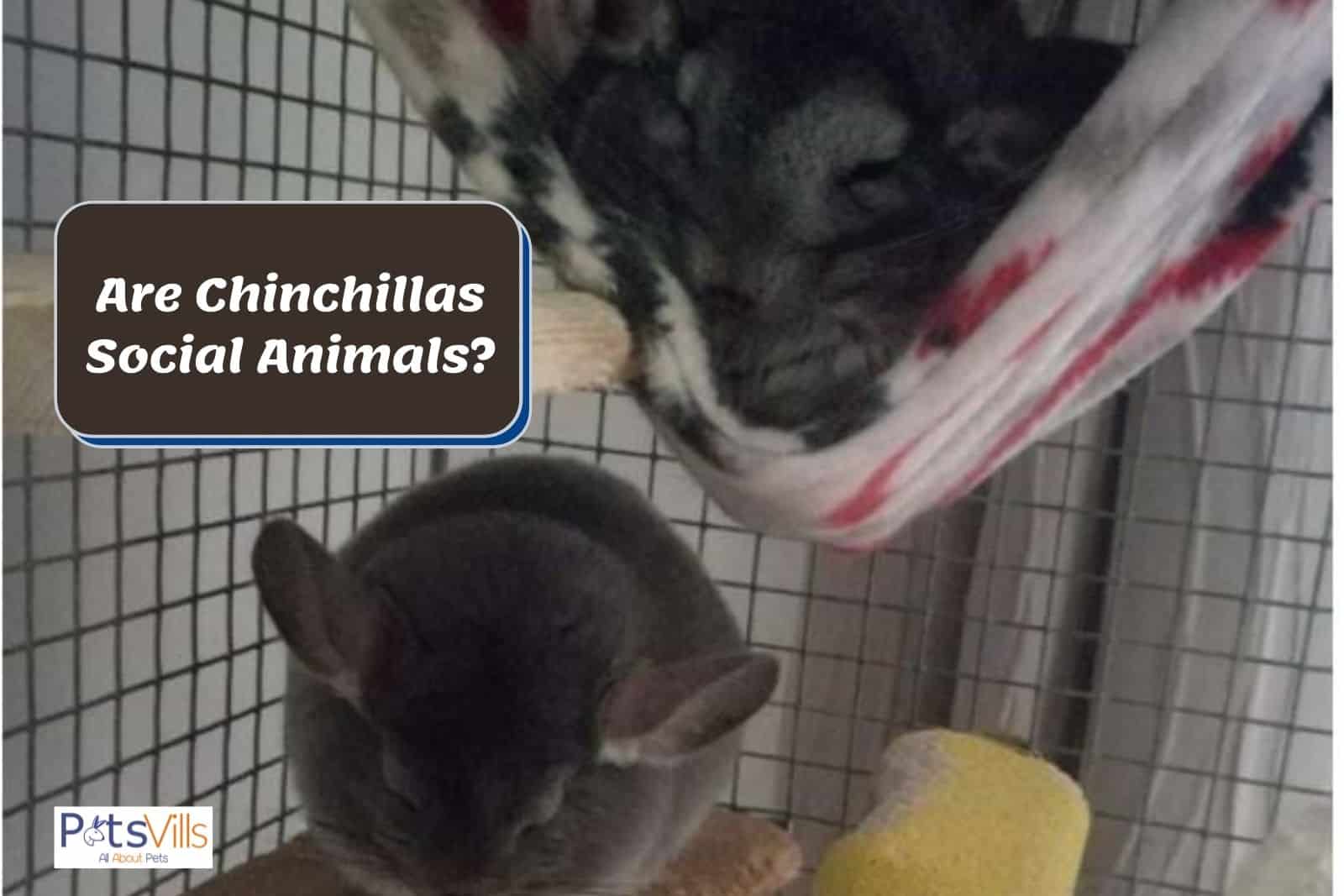The wild chinchillas live in reasonably large groups known as colonies or herds. A single herd may have up to 14 to 100 members!
They assign themselves special social roles. For example, some of them will look out and inform the rest of the herd when there’s danger.
Are chinchillas social animals? The wild chinchillas live in large colonies with up to 100 different chinchillas.
Chinchillas can make excellent pets and are social animals that like to live with the company of another chinchilla.
Still, before adopting a chinchilla, you must first understand the behaviors of chinchillas and what to do when they fight.
READ MORE: Are Chinchillas Rodents?
Table of Contents
Can Chinchillas Live Together?
Yes, chinchillas can live together. They will prefer the extra company most of the time, but that doesn’t mean they aren’t going to fight.
 Make sure to have a spare carry cage just in case they start to fight.
Make sure to have a spare carry cage just in case they start to fight.
When you move them in with each other, keep a very close eye on how they behave.
When two or more chinchillas live together, you need a giant cage.
One adult chinchilla will need a larger cage than 3ft x 2ft x 2ft.
While two chinchillas don’t need double-space, it’s essential to make sure their cage is big enough for both of them.
For two chinchillas, a 3ft x 3ft x 3ft cage is a good size. It would be best to make sure the cage has a minimum of 2 square feet of floor space per chinchilla.
Get ready to be inspired and find the perfect name for your chinchilla with our fun and informative “Chinchilla Names” video:
How to Introduce Chinchillas
When introducing two chinchillas together, you want to do it gradually.
Place each chinchilla in the same room but their separate cage.
Make sure the cages are at least a few inches to a foot apart.
This allows the rodents to smell each other through the cages and to get used to and accept each different scent.
If both chinchillas don’t show any signs of aggression, it’s a good idea to keep moving the cages nearer.
After a week, you want the rodents to start accepting each other’s scents. There are a few different things you can do. You can switch the cages without changing the bedding, or you can allow the chinchillas to share a dust bath.
Chinchilla dust bath sharing is easier than cage switching.
Place a bit of the sand bath in a container and let one chinchilla use it.
When he’s done, let the other use it and return the bath to the first chinchilla.
Have your chinchillas share a bath for three to five days.
Afterward, allow the rodents to spend some out-of-cage time together. If the chinchillas seem to be getting along, then place both in the larger cage together.
Read our complete guide about why do chinchillas bathe in dust!
Here’s a video about chinchilla introduction.
READ MORE: What happens if a chinchilla gets wet?
Can Chinchillas Live Alone?
Just because chinchillas love colonies or herds doesn’t mean you must keep them in groups or pairs.
 Chinchillas [1] can live on their own if you take good care of them.
Chinchillas [1] can live on their own if you take good care of them.
Nevertheless, even animals who love their solidarity can appreciate companionship with others.
Make sure you’re giving your chinchilla the amount of attention and interaction that they need. You should spare an hour or two every day to interact with your chinchilla when they are awake.
What to Do if My Chinchillas Are Fighting?
There is a chance that your chinchillas will not get along.
This is common if you try to pair two females together as they are more territorial than males.
Although males are more dominant, this can cause fights if both rodents want to be dominant.
There are some obvious signs that you will see if your chinchillas are fighting with one another.
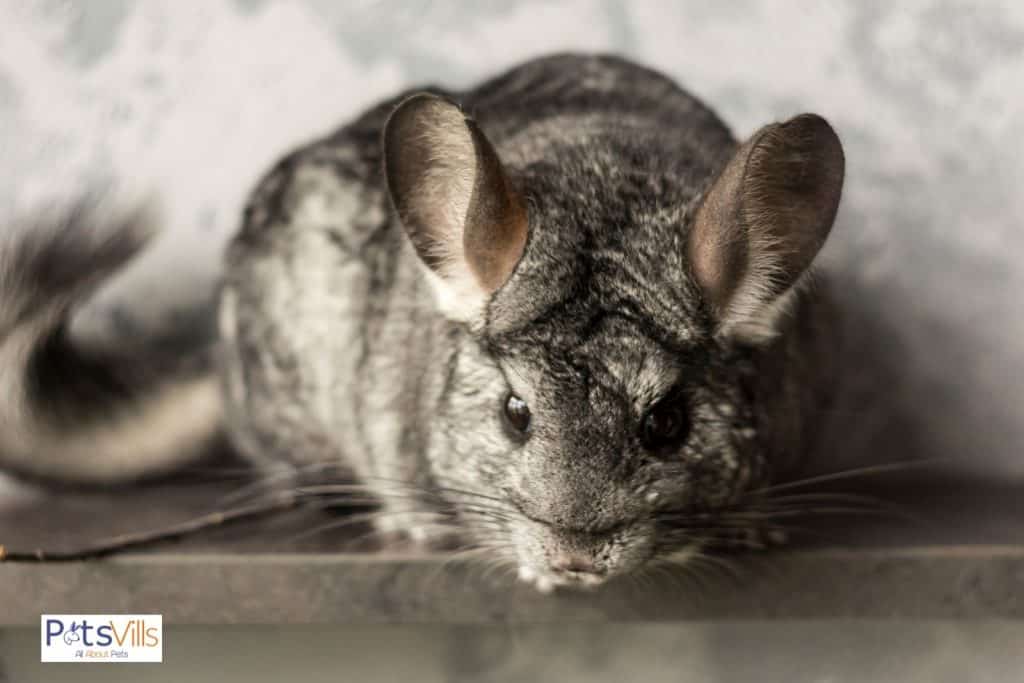
The animals will jump and charge at one another, though.
You should know that chinchilla fights are not particularly dangerous. Chinchillas have shorter and softer nails than other rodents, and they rarely bite.
While the fighting itself may not be harmful, it should be noted that chinchillas can become withdrawn and may stop eating or drinking if they are fighting with one another.
The animals may be jumpy and appear anxious or stressed.
Simply put, your pet will be depressed, fearful, and upset.
This is a normal reaction, especially for prey animals, like rodents, who are naturally cautious and hesitant about their surroundings.
If they start fighting, you will need to separate them and start the introduction from the beginning.
The Importance of Hiding Spots
Ensure you have sufficient nest boxes and hiding spots for each of your chinchillas if they get frightened or want to escape. [2]
Have one large box for your chinchillas to rest.
Chinchillas can be difficult during breeding or introducing them to a new environment.
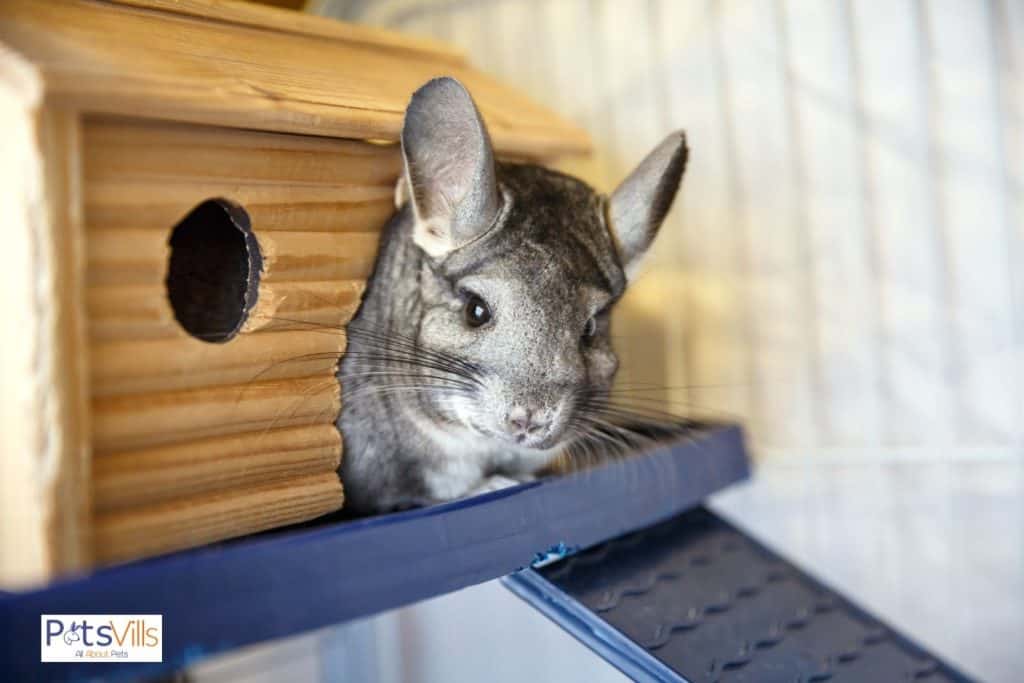
They can easily be bullied and may become frightened if they don’t find a way to escape.
Handling Your Chinchillas Daily at an Early Age
You must interact with your chinchilla every day to provide companionship.
They will see you as companions or friends if you handle your chinchillas from a tender age.
Chinchillas who are handled less when they are young may grow up to be more aggressive and less sociable.
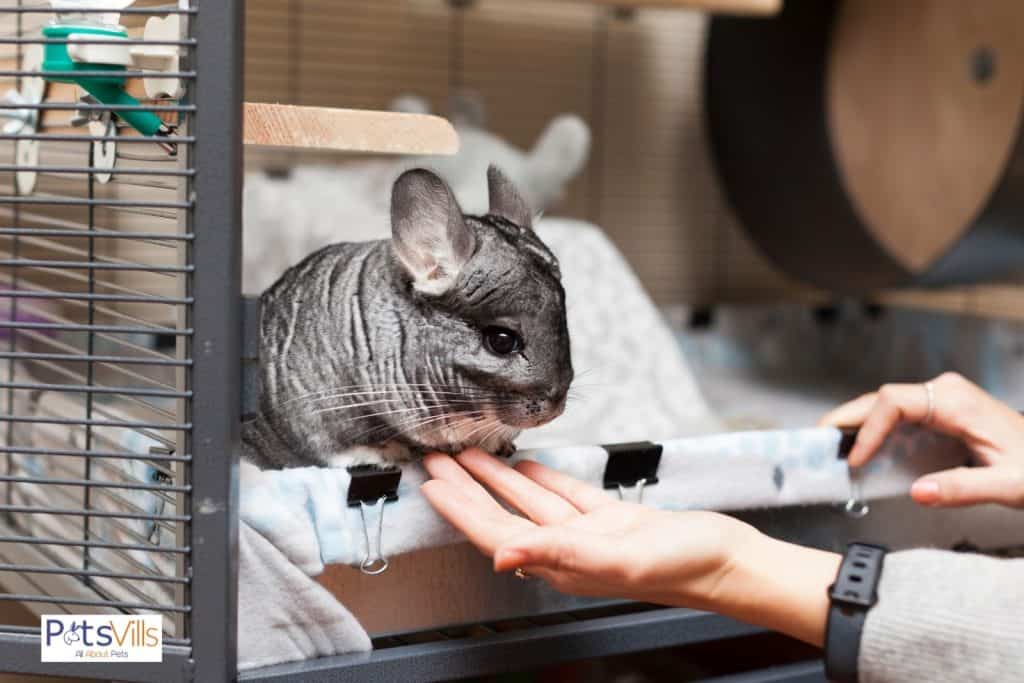
Allow your chinchilla to approach you for small treats. If you want to pick them up, do this slowly and gently not to damage their fur.
When introducing new chinchillas to a new environment, be gradual and keep close supervision.
Keep their cages near each other for a week before introducing them. Consult a clinical expert if you are facing any issues.
Can Chinchillas Play Together?
If you are lucky, your chinchillas will be happy to meet and play together.
There are some pretty telltale signs that your pets are getting along well.
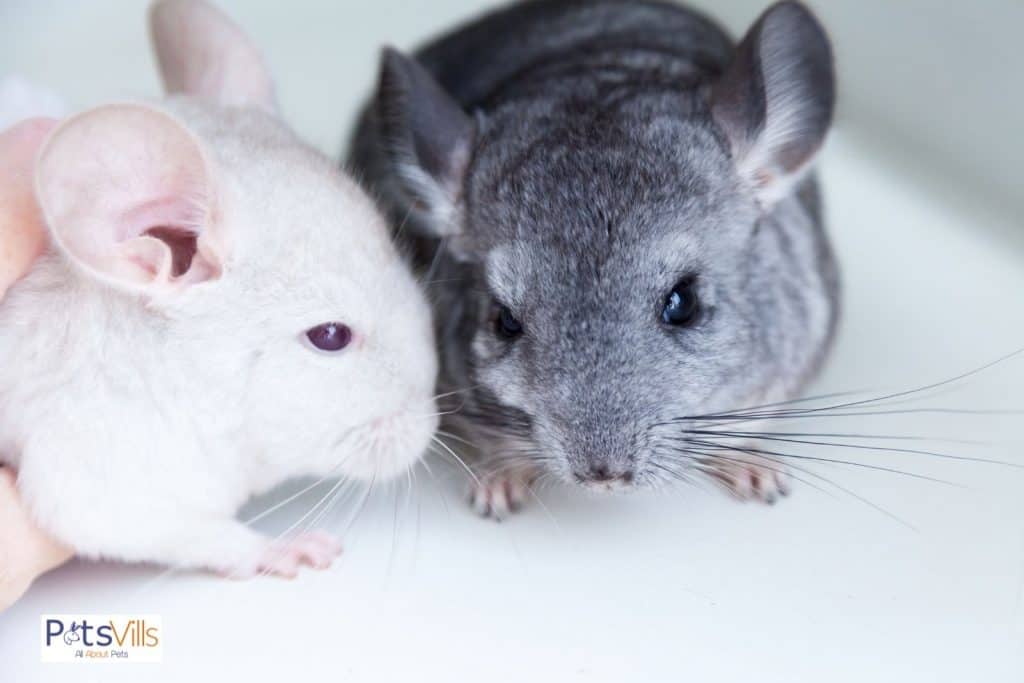
You may see your chinchillas wagging their tails. That’s right. Chinchillas wag their tails!
You are likely to hear a whole range of noises too, and they are distinct from the loud, abrupt, and aggressive barking noises that chinchillas make when they fight.
Low and gentle chirps and grunting sounds are common. Be prepared to hear different tones and duration as the animals communicate with one another.
As the animals get to know one another, they will jump together, chase each other, and play with toys provided to them.
According to research conducted on chinchillas kept in captivity, chinchillas do not spend much time playing.
The animals spend much more time feeding, resting, and displaying comfort-seeking behavior.
Chinchilla Bonding
If you are lucky, your pet chinchillas will bond with one another.
Bonding is different from the fundamental interactions you may notice when chinchillas play with one another.
Bonded chinchillas will be much more social with one another.
They may rest and sit side by side, and you might see the animals touching and napping with their eyes partially or fully closed.
The animals will also groom each other, and you may see your chins gently biting one another.
This is often called nibbling, and it is a sign of affection.
Of course, when one of your pets is a little too forceful with the grooming, you may hear a bit of a squeak or a grunt.
You should not be too concerned if you do not see your chinchillas “bonding”.
The animals are most likely to bond at a young age, and the rodents typically bond with family members.
Are Chinchilla’s Friendly?
Chinchillas can make excellent pets and are generally friendly animals for the right person. Before deciding on a pet chinchilla, please familiarize yourself with its unique characteristics and all aspects of its care.
Learn about chinchillas, how to care for them, and what supplies you need to provide a home for a chinchilla.
Domestic chinchillas can be kept as pets.
Chinchillas are crepuscular [3] (primarily active at dawn and dusk) somewhat nocturnal.
Chinchillas are naturally very skittish creatures and generally do not like to be held, although they can become very attached to their owners.
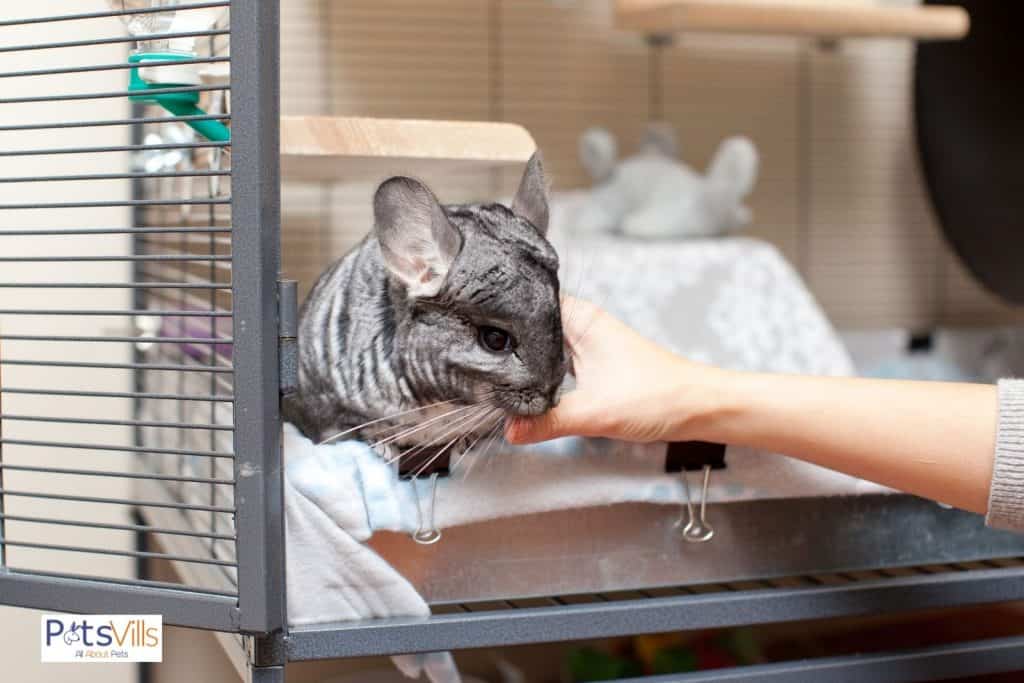
They are not usually considered to be good pets for young children.
However, chinchillas can be amiable animals if sufficiently acclimated to the human touch as kits (babies), making them excellent pets for patient owners.
Chinchillas typically live about 15 years, but living between 18-22 years is not uncommon.
Although they are generally small creatures, their body length can grow from 10-14 inches, and their height is about 5-6 inches.
Check out this video!
FAQs
Do chinchillas like to cuddle?

A chinchilla rarely likes to cuddle with people. They aren’t lap-pets for the most part. Chinchillas, in general, are fun and lively pets and very entertaining. But occasionally, you will get one that likes to snuggle up to you.
Do chinchillas recognize their owners?
They tend to be affectionate, curious, and social animals that bond closely with their owners and generally like to be held close and cuddled.
Can you sleep with your chinchilla?
No, chinchillas have a different sleeping pattern from humans. They sleep most of the day and awake up from dusk to dawn.
Resources
- 1. Chinchilla – an overview | ScienceDirect Topics [Internet]. www.sciencedirect.com. Available from: https://www.sciencedirect.com/topics/pharmacology-toxicology-and-pharmaceutical-science/chinchilla
- 2. The ideal home for Chinchillas [Internet]. www.pdsa.org.uk. Available from: https://www.pdsa.org.uk/pet-help-and-advice/looking-after-your-pet/small-pets/the-ideal-home-for-chinchillas
- 3. Bradford A. Chinchilla Facts [Internet]. Live Science. Live Science; 2014. Available from: https://www.livescience.com/28131-chinchillas.html

Are chinchillas social animals? What do you think? Please share your opinion!
Barry Stingmore is a British content writer living in Fuerteventura, Spain. An animal lover at heart, he shares his home with a dog and four rescue cats and has a passion for writing about animals big and small.
Barry loves finding answers to your animal-related questions, the more research involved the better! You can rely on him to find the facts.
Find him on FACEBOOK, TWITTER AND Linkedin
Read his latest ARTICLES.
Find more about him HERE.

